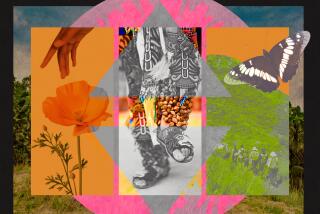Itinerary: Filipino L.A.
Filipinos have been in California since the 1500s, when they served as sailors on Spanish explorer ships, and their presence in Los Angeles dates to the 1781 establishment of El Pueblo de Nuestra Senora la Reina de los Angeles del Rio Porciuncula. Thousands more Filipinos immigrated here in the early 1900s as agricultural workers, and more in the mid-1900s under a program that provided training for technicians, lawyers and professionals. Filipinos now constitute the largest Asian community in Los Angeles County. The Filipino American community throws a bash this weekend in San Pedro that isn’t just a bunch of food booths and bands. Jazz, film, poetry and ballroom dancing are among activities offered for those who like to participate and those who just like to watch. Learning about a vibrant Asian culture is a not only a special dividend, but a reminder that Los Angeles is an encyclopedia of ethnic culture.
Friday
Have a Filipino breakfast at month-old Toto’s (4420 Eagle Rock Blvd., in Eagle Rock, [323] 257-1902. 7 a.m.-10 p.m. daily). Breakfast offerings include dried fish and marinated pork and chicken tocino, a type of cured meat.
Two short Filipino films are among those selected for the film program “Pinoy Visions 2001” to be shown at USC (George Lucas Screening Room, USC School of Cinema-Television, 850 W. 34th St., [213] 680-4462, 7:30 p.m. Free). “Silencio,” set in 1950s San Francisco, and “The Day the Dancers Came,” based on a short story by Filipino American writer Bienvenido Santos, are included.
Saturday
The 10th Annual Festival of Philippine Arts and Culture will be staged at Point Fermin Park (807 W. Paseo del Mar, San Pedro, [213] 389-3050, 10 a.m.-6 p.m.). Free parking and shuttle can be found at 22nd and Miner streets. Start with either the farmer’s market and vegetable competition in Senior’s Village, or the Ati-Atihan face painting in the Youth Pavilion. Don’t miss the colorful opening at 11 a.m. with national anthems and color guard.
All day Saturday and Sunday, kids can learn kite-and drum-making, play Filipino games and listen to stories. Join the discussions on health issues at the Generations Plaza Stage followed in the afternoon by a literary program, “Passages.”
Various Filipino American artists and dance troupes perform all day on the Main Stage, including rapper Ruthie Alcaide, comedian Rex Navarette and electronica group e:trinity. “Soulsa”/jazz recording artist Joe Bataan performs at 4 p.m. Bataan, who was born in Harlem to a Filipino father and Puerto Rican/African American mother, says this is his first performance “for an audience of my own.”
Sunday
Stop by Neri’s Bakery and Fast Food (534 S. Occidental Blvd., L.A.. Open Sunday, 8 a.m.-3 p.m. Monday to Saturday, 8 a.m.-8 p.m. [213] 738-1263). Although Neri Seneres no longer runs an actual bakery, she’d love to cook up some chicken or frilled pork barbeque, crispy pork, onion and vinegar sisig , or chicken adobo. Seneres claims her steamed ground rice cakes “are the best around.” Filipino music in the traditional vein happens at the festival Sunday. Local dance troupes Bibak and Kayamanan ng Lahi will appear on the Main Stage along with string group Rondalla Club of Los Angeles. Morning martial arts demonstrations will provide a warm-up for the third annual FPAC Balagtasan Poetry Slam on the Generations Plaza Stage. Learn ballroom dancing with Johnny Matuna and work up an appetite for more Filipino delicacies found at the Marketplace by the Sea area. Between 1:30 and 4 p.m., film selections from the “Pinoy Visions 2001” will be screened at the festival, as well as two new works from UCLA’s media ethnography program.
More to Read
Sign up for Essential California
The most important California stories and recommendations in your inbox every morning.
You may occasionally receive promotional content from the Los Angeles Times.









